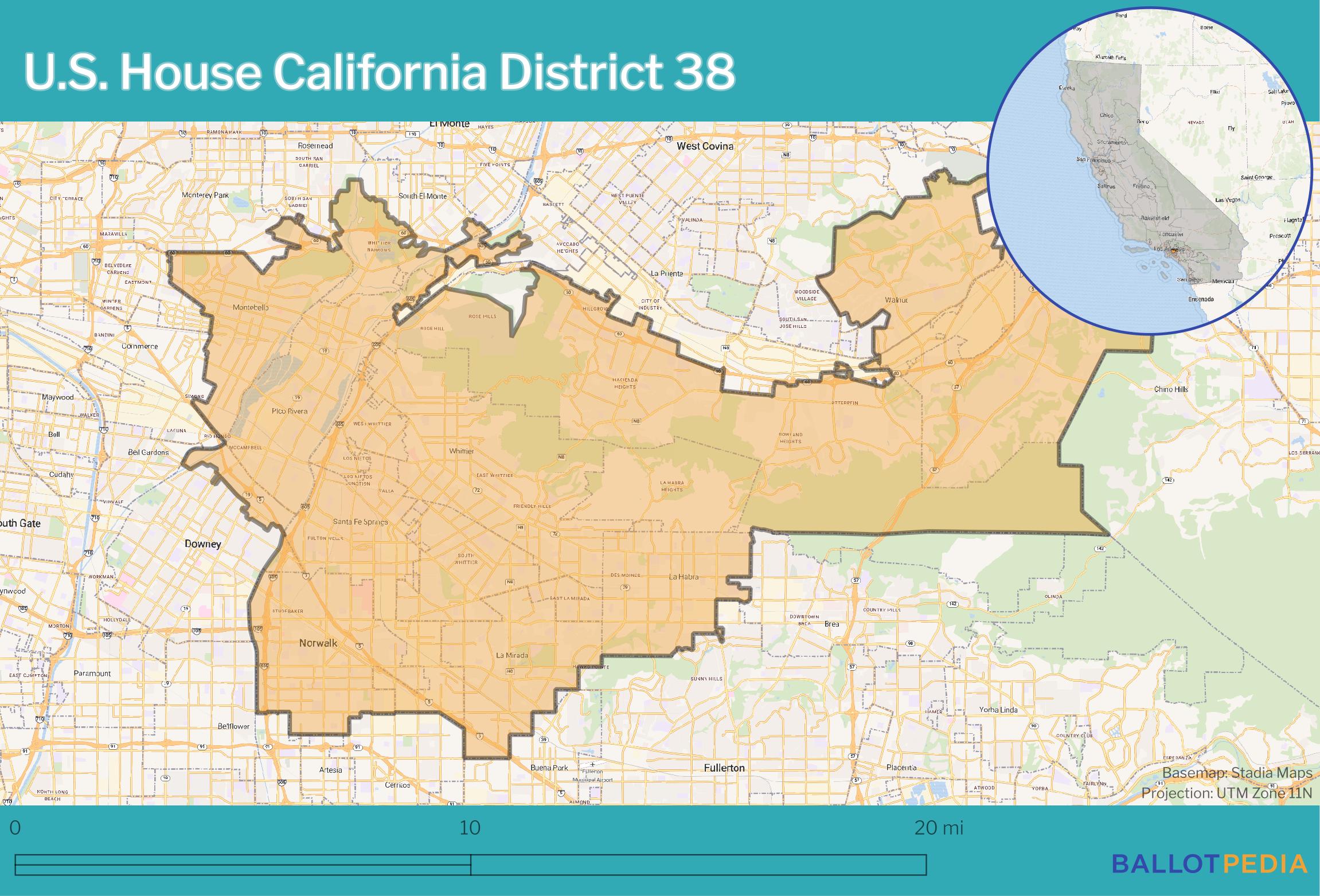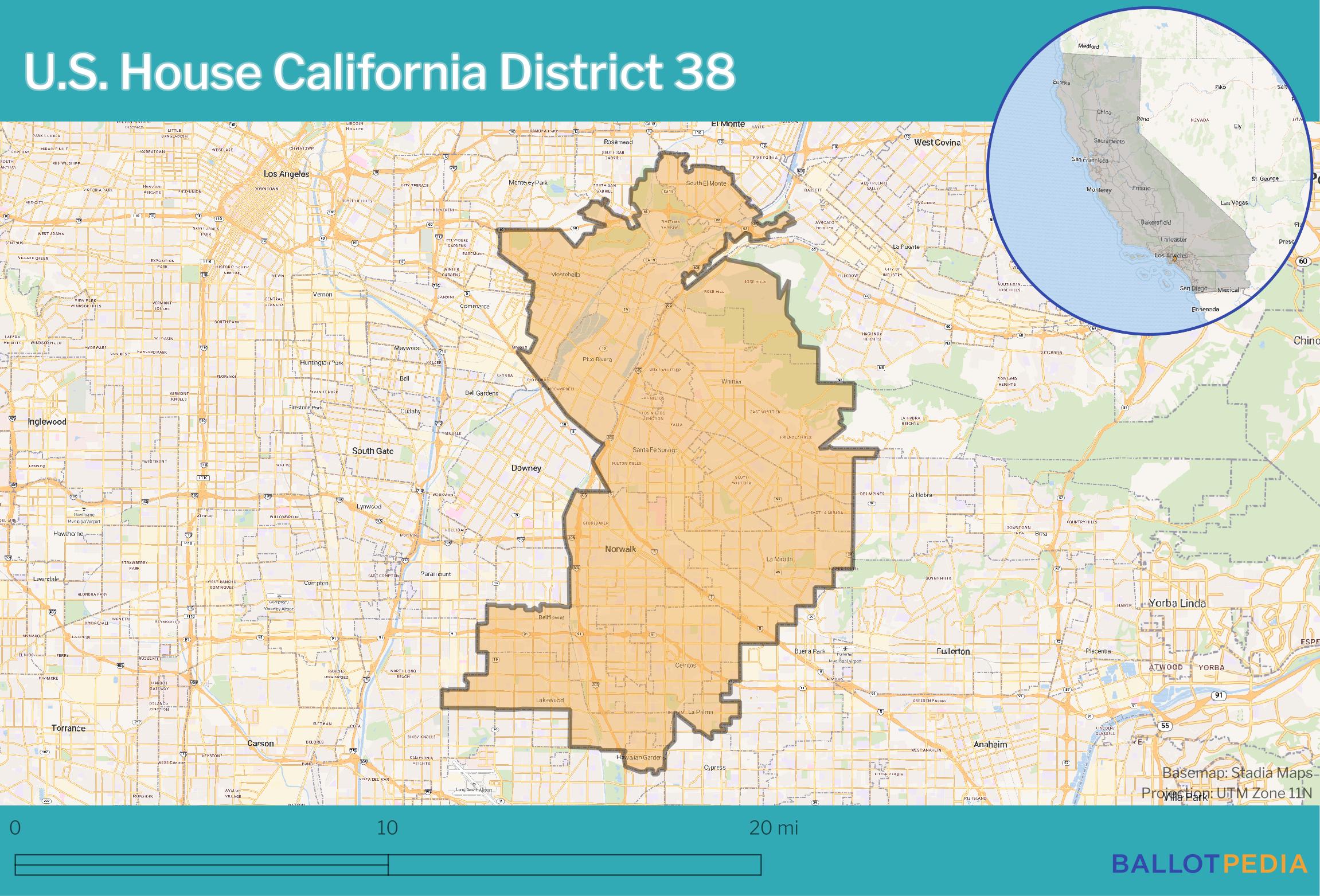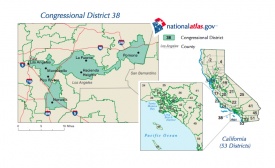California's 38th Congressional District
California's 38th Congressional District in the United States House of Representatives is represented by Linda Sánchez (D).
As of the 2020 Census, California representatives represented an average of 761,091 residents. After the 2010 Census, each member represented 704,566 residents.
Elections
See also: California's 38th Congressional District election, 2030
There are no official candidates yet for this election.
See also: California's 38th Congressional District election, 2028
There are no official candidates yet for this election.
See also: California's 38th Congressional District election, 2026
General election
The primary will occur on June 2, 2026. The general election will occur on November 3, 2026. General election candidates will be added here following the primary.
Nonpartisan primary
Nonpartisan primary election for U.S. House California District 38
Incumbent Linda Sánchez (D), Thomas Adams-Falconer (D), Monica Sanchez (D), and Hilda Solis (D) are running in the primary for U.S. House California District 38 on June 2, 2026.
Candidate | ||
 | Linda Sánchez (D) | |
| Thomas Adams-Falconer (D) | ||
| Monica Sanchez (D) | ||
| Hilda Solis (D) | ||
 = candidate completed the Ballotpedia Candidate Connection survey. = candidate completed the Ballotpedia Candidate Connection survey. | ||||
| If you are a candidate and would like to tell readers and voters more about why they should vote for you, complete the Ballotpedia Candidate Connection Survey. | ||||
Do you want a spreadsheet of this type of data? Contact our sales team. | ||||
See also: California's 38th Congressional District election, 2024
General election
General election for U.S. House California District 38
Incumbent Linda Sánchez (D) defeated Eric Ching (R) in the general election for U.S. House California District 38 on November 5, 2024.
Candidate | % | Votes | ||
| ✔ |  | Linda Sánchez (D) | 59.8 | 165,110 |
 | Eric Ching (R) | 40.2 | 110,818 | |
| Total votes: 275,928 | ||||
 = candidate completed the Ballotpedia Candidate Connection survey. = candidate completed the Ballotpedia Candidate Connection survey. | ||||
| If you are a candidate and would like to tell readers and voters more about why they should vote for you, complete the Ballotpedia Candidate Connection Survey. | ||||
Do you want a spreadsheet of this type of data? Contact our sales team. | ||||
Nonpartisan primary
Nonpartisan primary election for U.S. House California District 38
Incumbent Linda Sánchez (D) and Eric Ching (R) defeated John Sarega (R) and Robert Zhang Ochoa (R) in the primary for U.S. House California District 38 on March 5, 2024.
Candidate | % | Votes | ||
| ✔ |  | Linda Sánchez (D) | 56.2 | 62,325 |
| ✔ |  | Eric Ching (R) | 24.1 | 26,744 |
| John Sarega (R) | 12.5 | 13,841 | ||
 | Robert Zhang Ochoa (R)  | 7.2 | 8,034 | |
| Total votes: 110,944 | ||||
 = candidate completed the Ballotpedia Candidate Connection survey. = candidate completed the Ballotpedia Candidate Connection survey. | ||||
| If you are a candidate and would like to tell readers and voters more about why they should vote for you, complete the Ballotpedia Candidate Connection Survey. | ||||
Do you want a spreadsheet of this type of data? Contact our sales team. | ||||
See also: California's 38th Congressional District election, 2022
General election
General election for U.S. House California District 38
Incumbent Linda Sánchez (D) defeated Eric Ching (R) in the general election for U.S. House California District 38 on November 8, 2022.
Candidate | % | Votes | ||
| ✔ |  | Linda Sánchez (D) | 58.1 | 101,260 |
 | Eric Ching (R)  | 41.9 | 73,051 | |
| Total votes: 174,311 | ||||
 = candidate completed the Ballotpedia Candidate Connection survey. = candidate completed the Ballotpedia Candidate Connection survey. | ||||
| If you are a candidate and would like to tell readers and voters more about why they should vote for you, complete the Ballotpedia Candidate Connection Survey. | ||||
Do you want a spreadsheet of this type of data? Contact our sales team. | ||||
Nonpartisan primary
Nonpartisan primary election for U.S. House California District 38
Incumbent Linda Sánchez (D) and Eric Ching (R) defeated John Sarega (R) in the primary for U.S. House California District 38 on June 7, 2022.
Candidate | % | Votes | ||
| ✔ |  | Linda Sánchez (D) | 58.7 | 58,586 |
| ✔ |  | Eric Ching (R)  | 30.5 | 30,436 |
| John Sarega (R) | 10.8 | 10,768 | ||
| Total votes: 99,790 | ||||
 = candidate completed the Ballotpedia Candidate Connection survey. = candidate completed the Ballotpedia Candidate Connection survey. | ||||
| If you are a candidate and would like to tell readers and voters more about why they should vote for you, complete the Ballotpedia Candidate Connection Survey. | ||||
Do you want a spreadsheet of this type of data? Contact our sales team. | ||||
Withdrawn or disqualified candidates
- Sylvester Ani (D)
- Elizabeth Moreira (D)
- Mitch Clemmons (R)
See also: California's 38th Congressional District election, 2020
General election
General election for U.S. House California District 38
Incumbent Linda Sánchez (D) defeated Michael Tolar (D) in the general election for U.S. House California District 38 on November 3, 2020.
Candidate | % | Votes | ||
| ✔ |  | Linda Sánchez (D) | 74.3 | 190,467 |
 | Michael Tolar (D) | 25.7 | 65,739 | |
| Total votes: 256,206 | ||||
 = candidate completed the Ballotpedia Candidate Connection survey. = candidate completed the Ballotpedia Candidate Connection survey. | ||||
| If you are a candidate and would like to tell readers and voters more about why they should vote for you, complete the Ballotpedia Candidate Connection Survey. | ||||
Do you want a spreadsheet of this type of data? Contact our sales team. | ||||
Nonpartisan primary
Nonpartisan primary election for U.S. House California District 38
Incumbent Linda Sánchez (D) and Michael Tolar (D) advanced from the primary for U.S. House California District 38 on March 3, 2020.
Candidate | % | Votes | ||
| ✔ |  | Linda Sánchez (D) | 77.7 | 90,872 |
| ✔ |  | Michael Tolar (D) | 22.3 | 26,075 |
| Total votes: 116,947 | ||||
 = candidate completed the Ballotpedia Candidate Connection survey. = candidate completed the Ballotpedia Candidate Connection survey. | ||||
| If you are a candidate and would like to tell readers and voters more about why they should vote for you, complete the Ballotpedia Candidate Connection Survey. | ||||
Do you want a spreadsheet of this type of data? Contact our sales team. | ||||
Withdrawn or disqualified candidates
- Paul Irving Jones (Independent)
See also: United States House of Representatives elections in California, 2018
General election
General election for U.S. House California District 38
Incumbent Linda Sánchez (D) defeated Ryan Downing (R) in the general election for U.S. House California District 38 on November 6, 2018.
Candidate | % | Votes | ||
| ✔ |  | Linda Sánchez (D) | 68.9 | 139,188 |
 | Ryan Downing (R) | 31.1 | 62,968 | |
| Total votes: 202,156 | ||||
 = candidate completed the Ballotpedia Candidate Connection survey. = candidate completed the Ballotpedia Candidate Connection survey. | ||||
| If you are a candidate and would like to tell readers and voters more about why they should vote for you, complete the Ballotpedia Candidate Connection Survey. | ||||
Do you want a spreadsheet of this type of data? Contact our sales team. | ||||
Nonpartisan primary
Nonpartisan primary election for U.S. House California District 38
Incumbent Linda Sánchez (D) and Ryan Downing (R) advanced from the primary for U.S. House California District 38 on June 5, 2018.
Candidate | % | Votes | ||
| ✔ |  | Linda Sánchez (D) | 62.7 | 54,691 |
| ✔ |  | Ryan Downing (R) | 37.3 | 32,584 |
| Total votes: 87,275 | ||||
 = candidate completed the Ballotpedia Candidate Connection survey. = candidate completed the Ballotpedia Candidate Connection survey. | ||||
| If you are a candidate and would like to tell readers and voters more about why they should vote for you, complete the Ballotpedia Candidate Connection Survey. | ||||
Do you want a spreadsheet of this type of data? Contact our sales team. | ||||
District map

Redistricting
2025-2026
After Texas Republicans launched their congressional redistricting effort, California Gov. Gavin Newsom (D) tweeted on July 15, 2025, "two can play that game."[15] In August 2025, California began taking official action toward congressional redistricting ahead of the 2026 elections. Redistricting in California required the passage of a constitutional amendment in a November special election to permit the adoption of a replacement map through 2030. On August 21, 2025, the California Legislature passed a redistricting plan setting a special election for a constitutional amendment to redraw the state's congressional district boundaries. Gov. Gavin Newsom (D) signed the two bills and scheduled a Nov. 4, 2025, special election.[16] Voters approved the proposition by a 65%-35% vote, allowing the map that would make five districts more favorable to Democrats to take effect.[17]
2020-2021
After the 2020 census, the California Citizens Redistricting Commission voted 14-0 in favor of a new congressional district map on December 20, 2021, and delivered those maps to the secretary of state on December 27, 2021.[18][19] California was apportioned 52 seats in the U.S. House of Representatives after the 2020 census, a net loss of one seat compared to apportionment after the 2010 census. This map took effect for California's 2022 congressional elections.
How does redistricting in California work? In California, a non-politician commission draws both congressional and state legislative district lines. Established in 2008 by ballot initiative, the commission comprises 14 members: five Democrats, five Republicans, and four belonging to neither party. A panel of state auditors selects the pool of nominees from which the commissioners are appointed. This pool comprises 20 Democrats, 20 Republicans, and 20 belonging to neither party. The majority and minority leaders of both chambers of the state legislature may each remove two members from each of the aforementioned groups. The first eight commission members are selected at random from the remaining nominees. These first eight comprise three Democrats, three Republicans, and two belonging to neither party. The first eight commissioners appoint the remaining six, which must include two Democrats, two Republicans, and two belonging to neither party.[20]
Commissioners must meet the following requirements in order to serve:[20]
- Members must have voted in at least two of the last three statewide elections.
- Members cannot have switched party affiliation for at least five years.
- "Neither commissioners nor immediate family may have been, within 10 years of appointment, a candidate for federal or state office or member of a party central committee; an officer, employee, or paid consultant to a federal or state candidate or party; a registered lobbyist or paid legislative staff; or a donor of more than $2,000 to an elected candidate."
- Members cannot be "staff, consultants or contractors for state or federal government" while serving as commissioners. The same prohibition applies to the family of commission members.
In order to approve a redistricting plan, nine of the commission's 14 members must vote for it. These nine must include three Democrats, three Republicans, and three belonging to neither party. Maps drawn by the commission may be overturned by public referendum. In the event that a map is overturned by the public, the California Supreme Court must appoint a group to draw a new map.[20]
The California Constitution requires that districts be contiguous. Further, the state constitution mandates that "to the extent possible, [districts] must ... preserve the geographic integrity of cities, counties, neighborhoods and communities of interest." Districts must also "encourage compactness." State Senate and Assembly districts should be nested within each other where possible.[20]
2020

2024

2010-2011
In 2011, the California State Legislature re-drew the congressional districts based on updated population information from the 2010 census.
District analysis
- See also: The Cook Political Report's Partisan Voter Index
- See also: FiveThirtyEight's elasticity scores
2026
Heading into the 2026 elections, based on results from the 2024 and 2020 presidential elections, the Cook Partisan Voter Index for this district is D+10. This meant that in those two presidential elections, this district's results were 10 percentage points more Democratic than the national average. This made California's 38th the 129th most Democratic district nationally.[21]
2024
Heading into the 2024 elections, based on results from the 2020 and 2016 presidential elections, the Cook Partisan Voter Index for this district was D+14. This meant that in those two presidential elections, this district's results were 14 percentage points more Democratic than the national average. This made California's 38th the 100th most Democratic district nationally.[22]
Daily Kos calculated what the results of the 2020 presidential election in this district would have been following redistricting. Joe Biden (D) would have defeated Donald Trump (R) 64.1%-33.9%.[23]
2022
Heading into the 2022 elections, based on results from the 2020 and 2016 presidential elections, the Cook Partisan Voter Index for this district was D+14. This meant that in those two presidential elections, this district's results were 14 percentage points more Democratic than the national average. This made California's 38th the 98th most Democratic district nationally.[24]
Daily Kos calculated what the results of the 2020 presidential election in this district would have been following redistricting. Joe Biden (D) would have received 64.1% of the vote in this district and Donald Trump (R) would have received 33.9%.[25]
2018
Heading into the 2018 elections, based on results from the 2016 and 2012 presidential elections, the Cook Partisan Voter Index for this district was D+17. This meant that in those two presidential elections, this district's results were 17 percentage points more Democratic than the national average. This made California's 38th Congressional District the 78th most Democratic nationally.[26]
FiveThirtyEight's September 2018 elasticity score for states and congressional districts measured "how sensitive it is to changes in the national political environment." This district's elasticity score was 0.85. This means that for every 1 point the national political mood moved toward a party, the district was expected to move 0.85 points toward that party.[27]
See also
- Redistricting in California
- California's 38th Congressional District election, 2026
- California's 38th Congressional District election, 2024
- California's 38th Congressional District election, 2022
- California's 38th Congressional District election, 2020
- California's 38th Congressional District election, 2018
External links
Footnotes
- ↑ California Secretary of State, "Certified List of Candidates for Voter-Nominated Offices June 7, 2016, Presidential Primary Election," accessed April 4, 2016
- ↑ The New York Times, "California Primary Results," June 7, 2016
- ↑ Politico, "2012 Election Map, California," accessed August 15, 2012
- ↑ U.S. Congress House Clerk, "Statistics of the Congressional Election of November 2, 2010," accessed March 28, 2013
- ↑ U.S. Congress House Clerk, "Statistics of the Congressional Election of November 4, 2008," accessed March 28, 2013
- ↑ U.S. Congress House Clerk, "Statistics of the Congressional Election of November 7, 2006," accessed March 28, 2013
- ↑ U.S. Congress House Clerk, "Statistics of the Congressional Election of November 2, 2004," accessed March 28, 2013
- ↑ U.S. Congress House Clerk, "Statistics of the Congressional Election of November 5, 2002," accessed March 28, 2013
- ↑ U.S. Congress House Clerk, "Statistics of the Congressional Election of November 7, 2000," accessed March 28, 2013
- ↑ U.S. Congress House Clerk, "Statistics of the Congressional Election of November 3, 1998," accessed March 28, 2013
- ↑ U.S. Congress House Clerk, "Statistics of the Congressional Election of November 5, 1996," accessed March 28, 2013
- ↑ U.S. Congress House Clerk, "Statistics of the Congressional Election of November 8, 1994," accessed March 28, 2013
- ↑ U.S. Congress House Clerk, "Statistics of the Congressional Election of November 3, 1992," accessed March 28, 2013
- ↑ U.S. Congress House Clerk, "Statistics of the Congressional Election of November 6, 1990," accessed March 28, 2013
- ↑ Cite error: Invalid
<ref>tag; no text was provided for refs namednewsomtweet - ↑ New York Times, "California Democrats Pass Redistricting Plan to Counter Texas Republicans," August 21, 2025
- ↑ Cite error: Invalid
<ref>tag; no text was provided for refs namedapproved - ↑ Politico, "California’s new congressional map boosts Democrats," Dec. 21, 2021
- ↑ Lake County News, "California Citizens Redistricting Commission delivers maps to California Secretary of State," Dec. 28, 2021
- ↑ 20.0 20.1 20.2 20.3 All About Redistricting, "California," accessed April 21, 2015
- ↑ Cook Political Report, "2025 Cook PVI℠: District Map and List (119th Congress)," accessed July 1, 2025
- ↑ Cook Political Report, "The 2022 Cook Partisan Voting Index (Cook PVI℠)," accessed January 10, 2024
- ↑ Daily Kos, "Daily Kos Elections' 2020 presidential results by congressional district, for new and old districts," accessed September 15, 2022
- ↑ Cook Political Report, "The 2022 Cook Partisan Voting Index (Cook PVI℠)," accessed February 6, 2023
- ↑ Daily Kos, "Daily Kos Elections' 2020 presidential results by congressional district, for new and old districts," accessed September 15, 2022
- ↑ Cook Political Report, "Introducing the 2017 Cook Political Report Partisan Voter Index," April 7, 2017
- ↑ FiveThirtyEight, "Election Update: The Most (And Least) Elastic States And Districts," September 6, 2018





